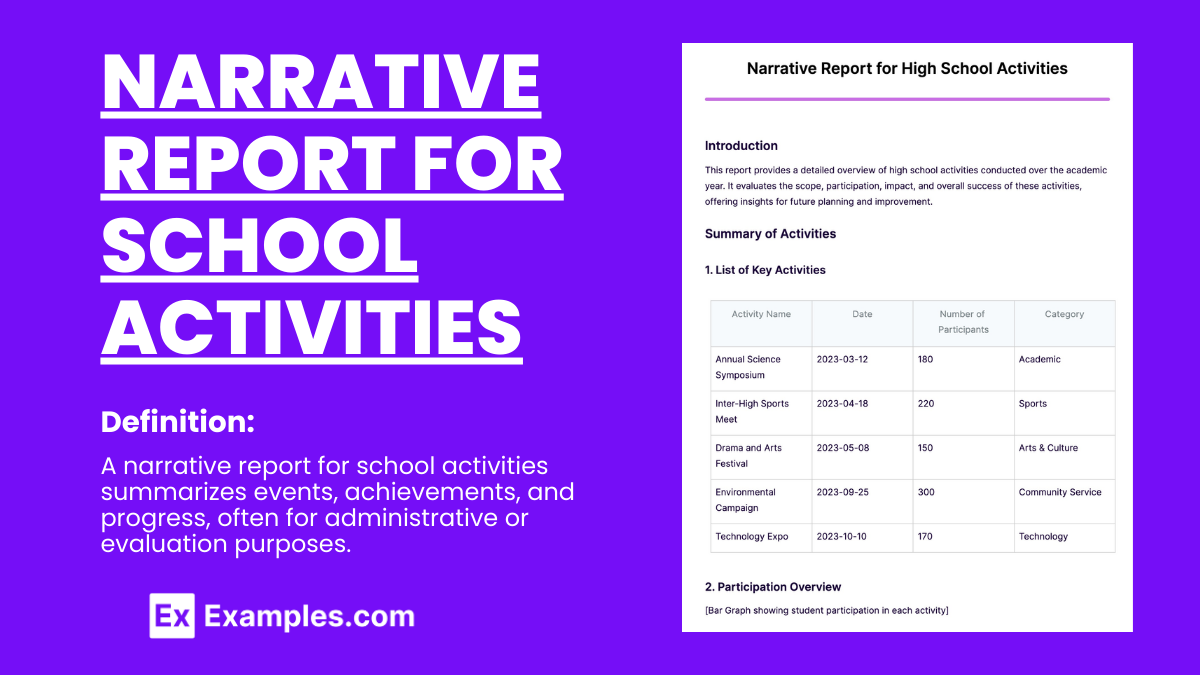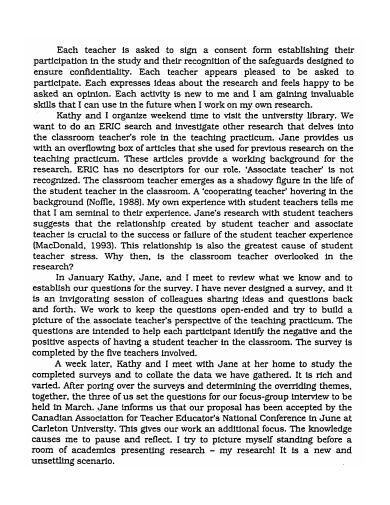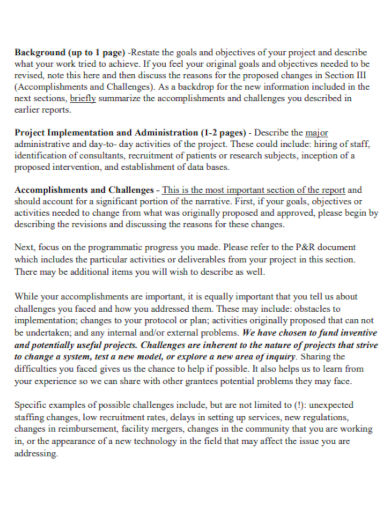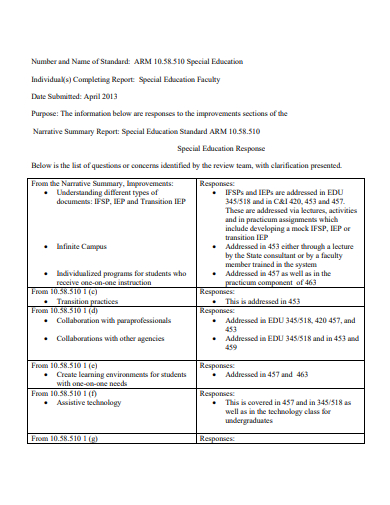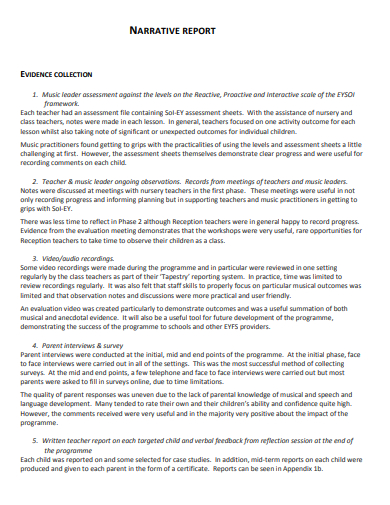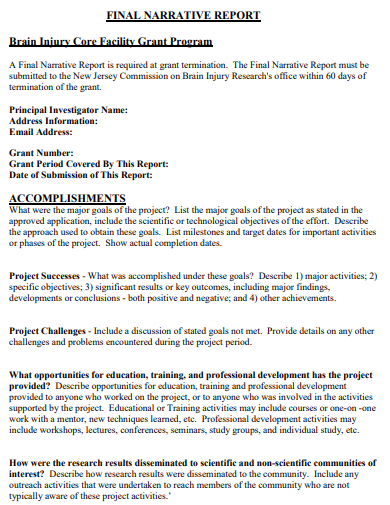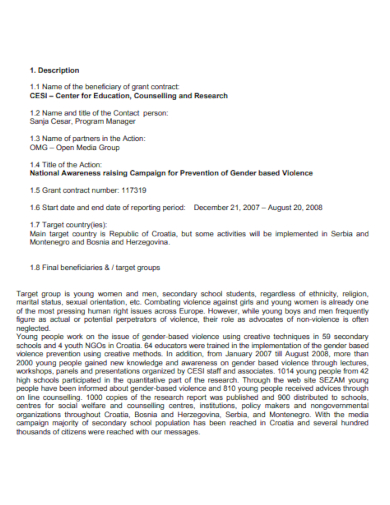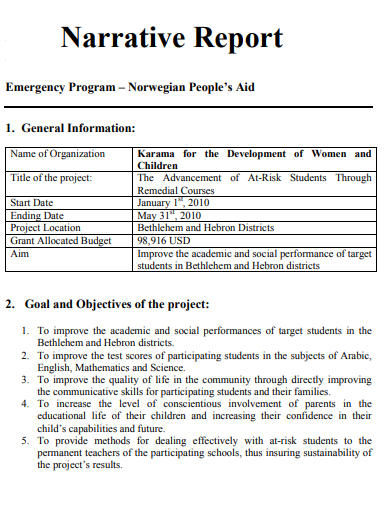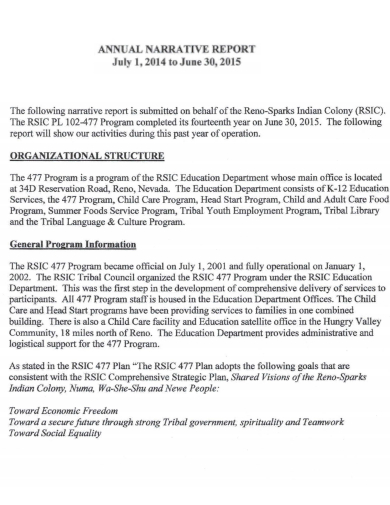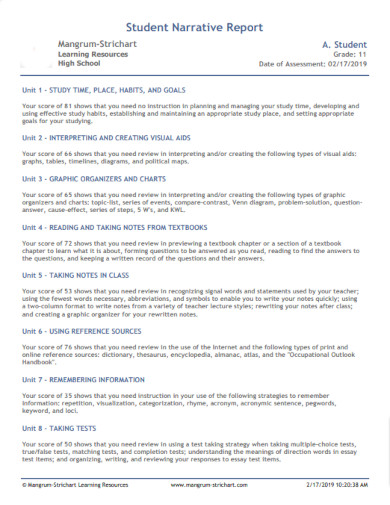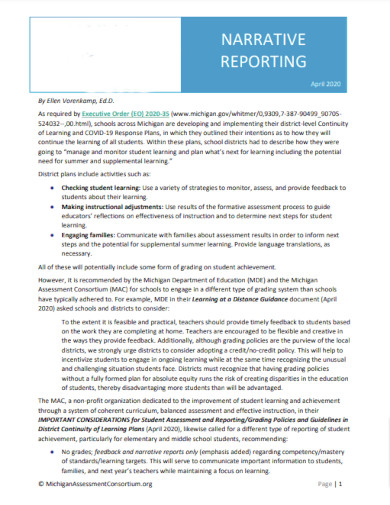13+ Narrative Report for School Activities Examples
It goes without saying when students are told to report example something to class, they would either take the challenge or they would refuse to even speak. Let alone do the project or do the reporting. It would seem that a lot of students refuse to do reporting for countless reasons, and to some teachers it can get very frustrating or somewhat depressing as well. The reason for this is because some students may find reporting a more daunting task than an activity made to train them for the future. However, we could not blame them for thinking that.
What Is a Narrative Report?
A narrative report is a detailed document, much like an essay, where you record and describe a specific topic or event comprehensively. This type of report is particularly common in academic settings, often referred to as an academic narrative report. For instance, students might be tasked with writing about a school activity, where they detail what happened during the activity, the events leading up to it, the people involved, and the overall event. The emphasis in an academic narrative report is on providing full details of the experience, much like narrating a story.
Similarly, in professional or daily life settings, this concept translates into what’s known as a daily narrative report. This type of report is used to document daily activities or events, detailing the occurrences, people involved, and the context of these activities. Whether in an academic or daily context, the narrative report’s essence is to narrate the events engagingly and informatively to the reader. It’s about explaining what happened, who was involved, why they were there, and discussing any unresolved aspects or outcomes of the event.
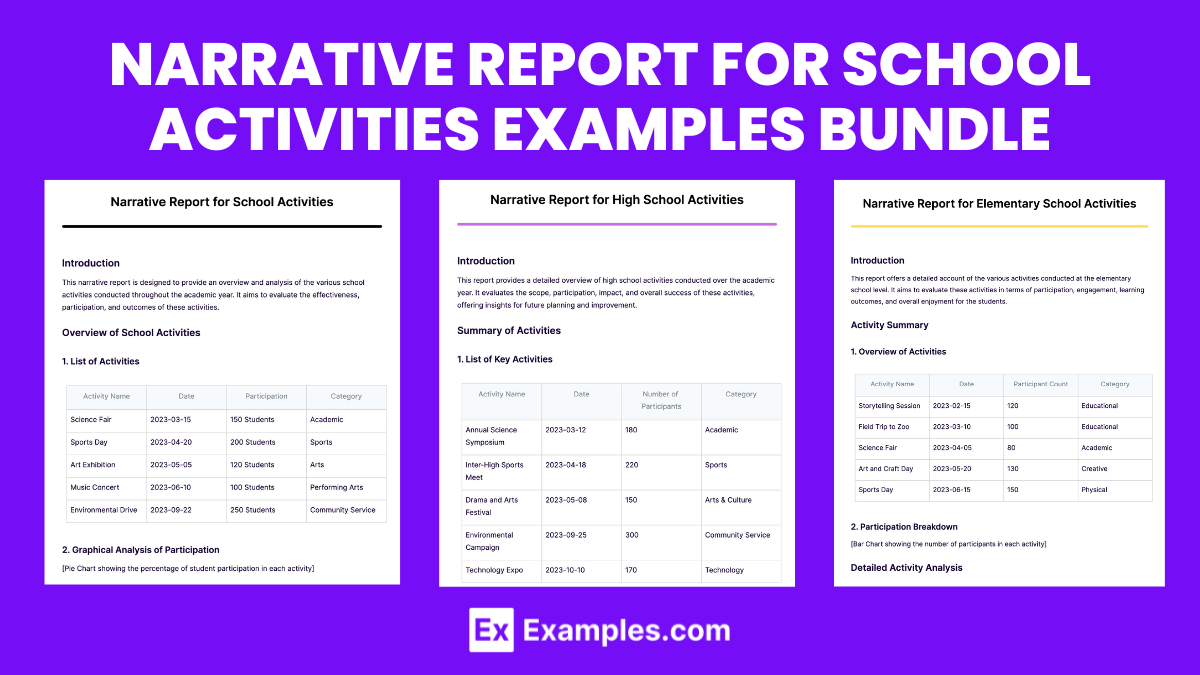
Download Narrative Report for School Activities Bundle
However, there are some who really do love to do reporting especially when it comes to reporting about their school activities. When students hear the words narrative report in a sentence, it is understandable that they would find this task daunting, yet, it can also be quite fun if you know what you’re doing. What if I told you that there is a really fun way of doing a report about your school activities? Will you take the plunge and try it out yourself? Did I capture your curiosity now? You should hop on that bus and start scrolling below now.
Format of Narrative Report for School Activities
Title Page
- Report Title: Clearly state the nature of the report. Example: “Narrative Report on [Name of School Activity]”
- Prepared by: Your Name and Role (if applicable)
- School Name
- Date of Submission
Table of Contents (Optional)
- List of sections with page numbers for easy navigation.
Introduction
- Purpose of the Report: Briefly explain the reason for the report.
- Overview of the Activity: Provide a short description of the school activity, including its objectives and significance.
Body of the Report
Pre-Activity Preparation
- Planning Stage: Discuss how the activity was planned, including any committees formed, meetings held, and roles assigned.
- Logistical Arrangements: Describe the preparation of materials, venue, and other logistical details.
Description of the Activity
- Chronological Account: Give a detailed account of the activity, in the order it happened.
- Participation Details: Mention the number of participants, key speakers, or guests, if applicable.
- Highlights: Focus on key moments, special performances, or significant achievements.
Challenges and Solutions
- Obstacles Encountered: Discuss any challenges faced before or during the activity.
- Problem-Solving Strategies: Explain how these challenges were addressed and resolved.
Conclusion
- Summary of Outcomes: Reflect on the success of the activity and whether its objectives were met.
- Learnings and Insights: Share valuable lessons learned from organizing or participating in the activity.
Example of Narrative Report for School Activities
Narrative Report on the Annual Science Fair
Prepared by: Sarah Johnson, Science Department Coordinator
Lincoln High School
Date: April 5, 2024The Annual Science Fair at Lincoln High School, held on March 15, 2024, was a testament to the inquisitive spirit and innovative prowess of our students. As the Science Department Coordinator, I had the privilege of leading the event’s organization, starting with the formation of a five-teacher committee in January 2024. Our tasks ranged from securing the gymnasium as our venue to managing participant registrations and publicity efforts.
As the day of the fair dawned, the gymnasium transformed into a vibrant hub of scientific exploration. Fifty student participants eagerly showcased their projects, which included an array of fascinating topics from homemade telescopes to solar-powered vehicles. The event commenced at 9 AM with a rousing opening address by our principal, Mr. David Lee. The atmosphere buzzed with excitement as students, teachers, and parents mingled, exploring the various exhibits.
The highlight of the day was the judging session, conducted by esteemed guests including local university professors and the notable Dr. Emily Turner. Despite the unforeseen challenge of two judges withdrawing last minute and a brief power outage, the event proceeded smoothly, thanks to quick thinking and effective problem-solving. Substitute judges were promptly arranged from among our staff, and the power outage was swiftly managed with emergency generators.
Reflecting on the event, the fair not only achieved its goal of fostering a love for science but also highlighted the importance of adaptability and preparedness. The enthusiasm displayed by the students in their scientific endeavors was truly inspiring. The fair concluded with an awards ceremony, where participants’ hard work and creativity were duly recognized and celebrated.
In summary, the Annual Science Fair was a resounding success, marked by high student engagement, innovative projects, and valuable learning experiences. This event has undoubtedly laid a strong foundation for fostering future scientists and innovators.
Special acknowledgments are due to the dedicated members of the Science Department, the student volunteers, and our guest judges, whose collective efforts were integral to the fair’s success.
Enclosed with this report are the event program, photographs from the fair, and feedback forms, which further illustrate the event’s vibrant atmosphere and its positive reception.
Sarah Johnson
Science Department Coordinator
Lincoln High School
13+ Narrative Report Examples for School Activities
1. Narrative Report for School Activities
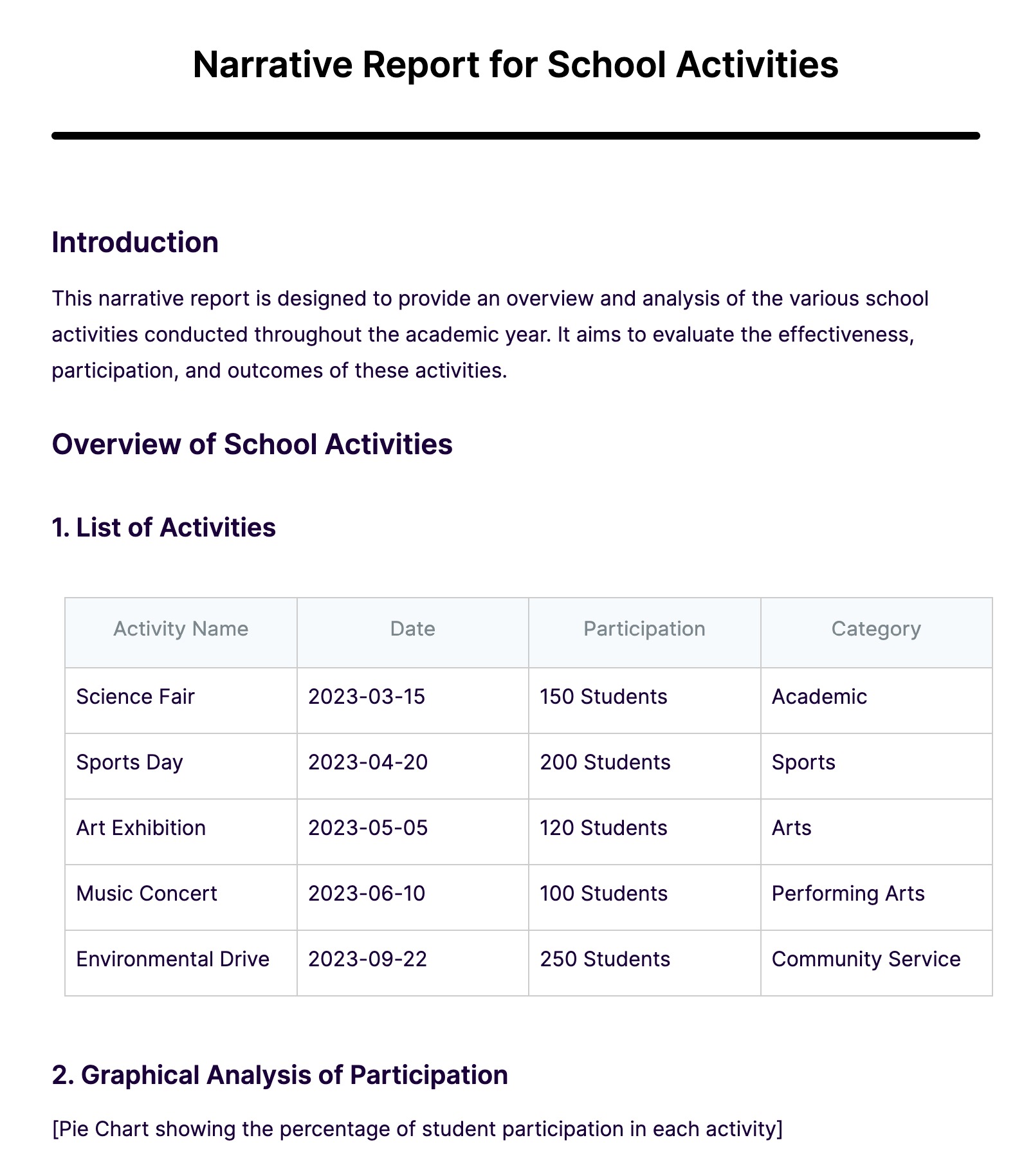
2. Narrative Report for High School Activities
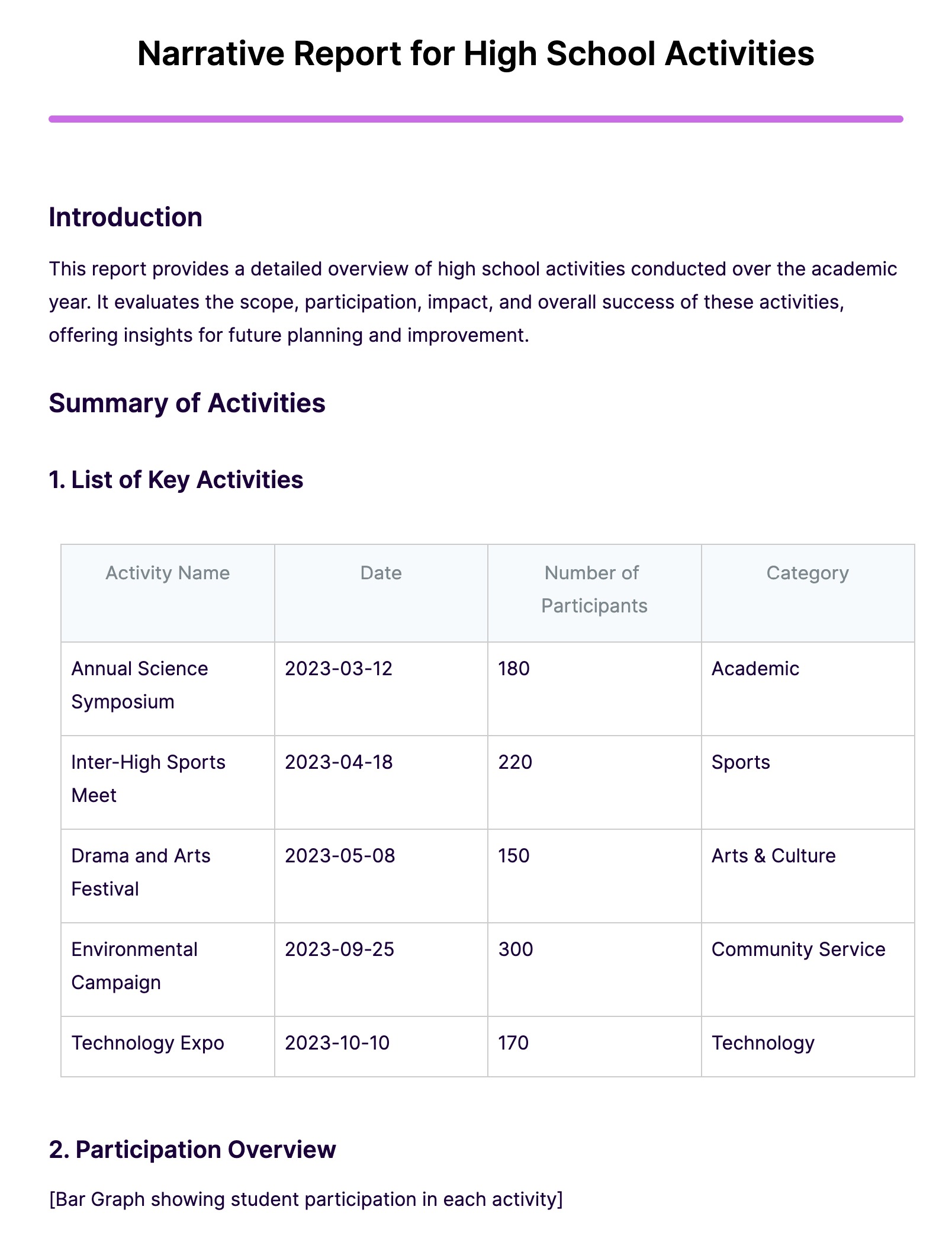
3. Narrative Report for Elementary School Activities
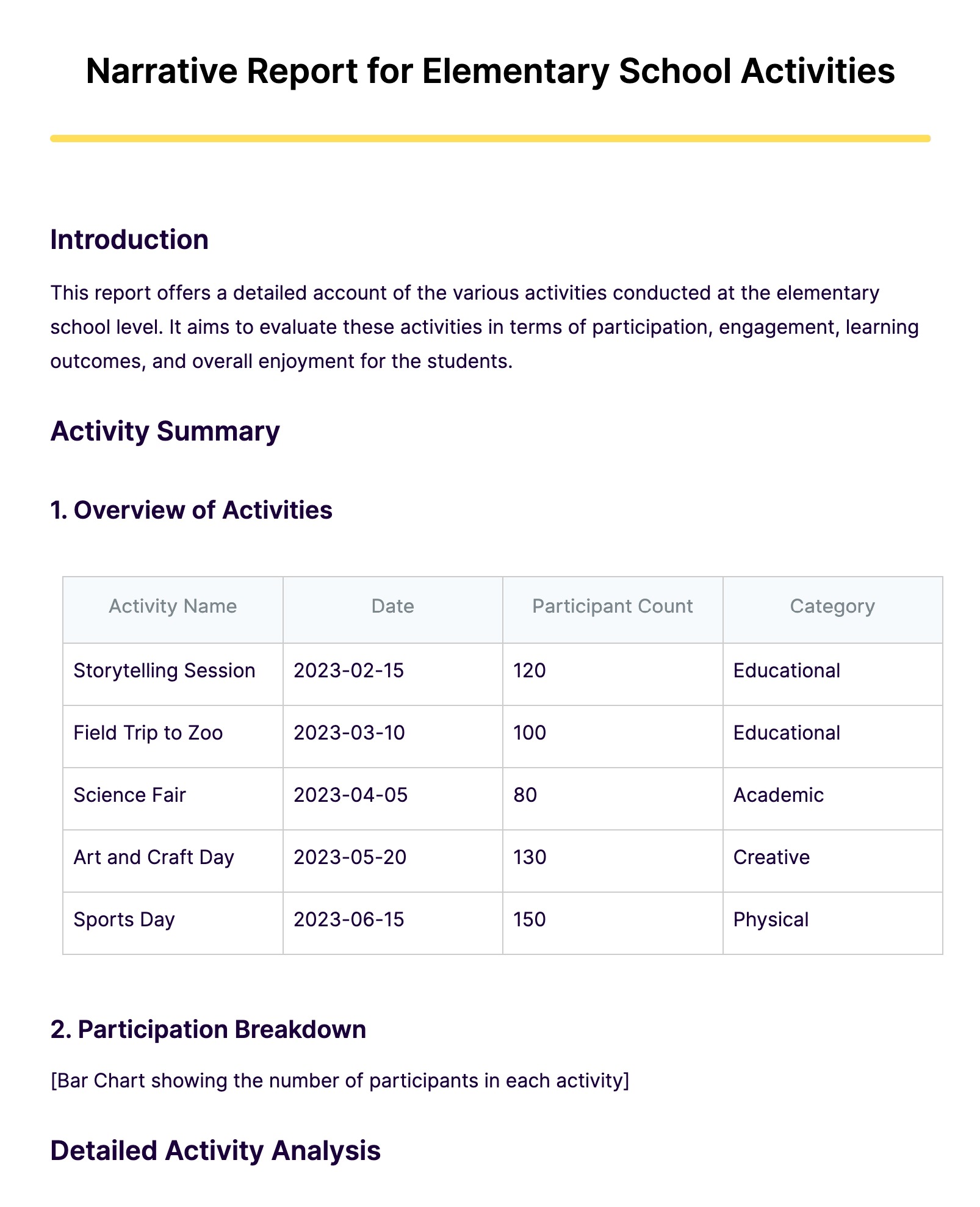
4. Narrative Report For Students
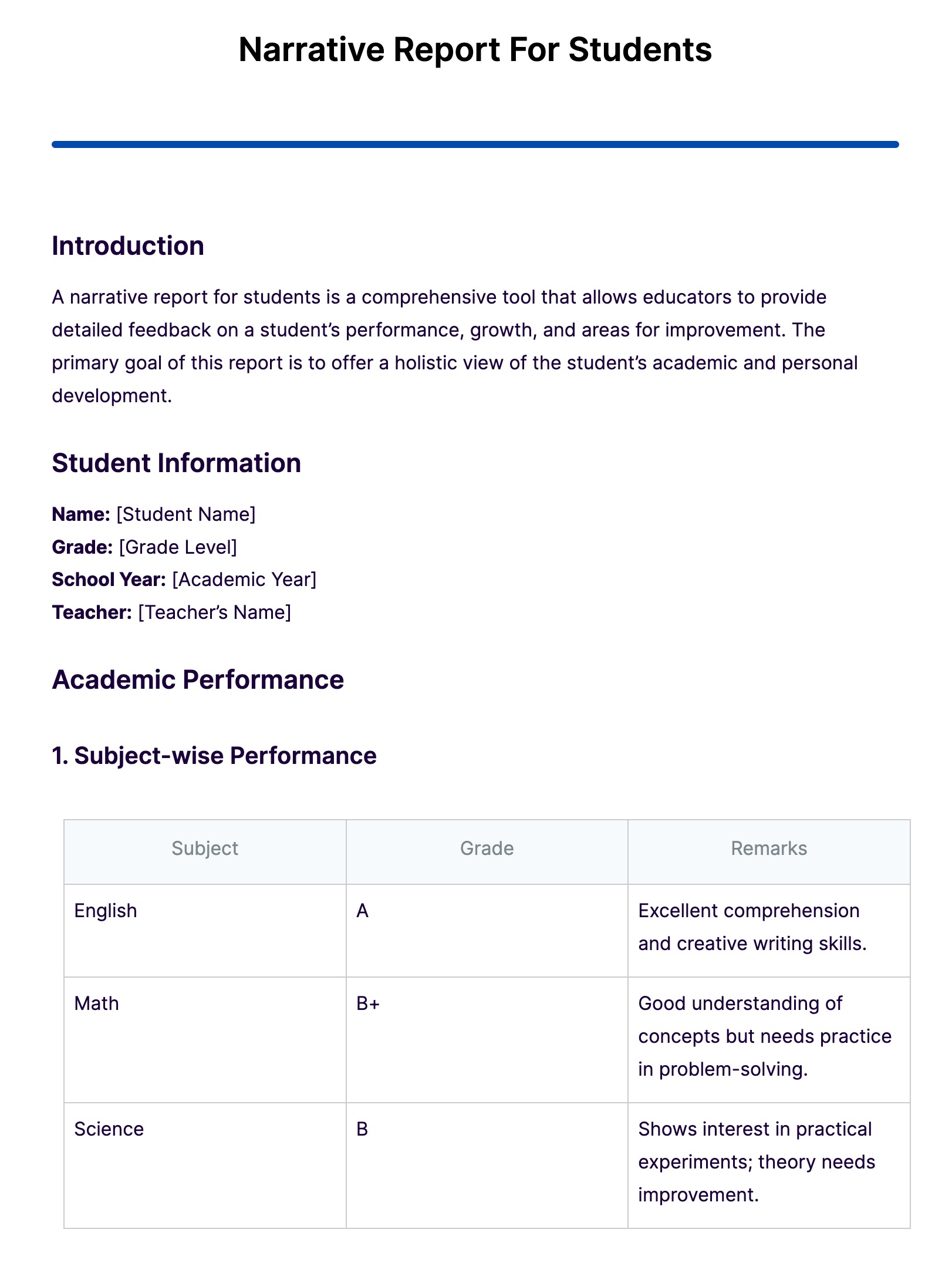
5. Simple Narrative Report for School Activities Format
6. Sample Weekly Narrative Report for School Activities
7. Special Educational Narrative Report for School Activities
8. Quarterly Narrative Report for School Activities
9. Final Narrative Report for School Activities
10. Professional Narrative Report for School Activities
11. Narrative Report of Remedial Courses for School Activities
12. Annual Narrative Report for School Activities
13. Narrative Report Example for Students
14. Example of School Narrative Report
How to Write a Narrative Report?
Crafting a narrative report, especially for school-related activities, can be an enriching process. Here’s a guide to help you create an engaging and well-structured narrative report, whether you’re aiming for a detailed narrative report essay or a succinct short narrative report.
- Start with a Draft: The first step in writing your report is brainstorming and drafting. Focus on the school activity you are reporting on and be specific in your descriptions. This clarity helps your readers grasp the essence of your topic. A well-thought-out draft is the backbone of your report, providing a clear roadmap for your narrative.
- Emphasize Detail: The power of your narrative lies in its details. It’s these nuances that captivate the reader and bring your report to life. Detailed descriptions allow your audience to understand and empathize with your viewpoint. Ensure that your narrative is rich with specifics to maintain reader interest and provide a complete picture of the event.
- Identify Participants: In your report, include the people who were part of the school event. Describe them vividly, making them relatable to your readers. This not only informs the reader about the event’s participants but also adds depth to your storytelling, making the report more engaging.
- Use Sensory Descriptions: To make your report more personal and relatable, incorporate sensory details. Describe what you saw, heard, smelled, touched, and tasted during the event. This approach helps the reader visualize the experience and feel as if they were present, enhancing the report’s impact.
- Conclude Thoughtfully: Once your draft is complete, refine it into a comprehensive and concise narrative. Include all relevant details and the people involved, weaving them into a cohesive story. Conclude your narrative on an optimistic note, providing a satisfying yet open-ended conclusion that leaves room for thought without being overly predictable.
By following these steps, you’ll be able to write a narrative report that not only documents an event in detail but also engages and informs the reader, whether it’s a comprehensive narrative report essay or a more concise short narrative report.
How do you Write a Narrative Report About an Activity?
1. Preparation:
- Review any guidelines or instructions for the report.
- Gather information and notes from the activity.
- Organize your thoughts and ideas.
2. Introduction:
- Start with an engaging introduction that introduces the activity and its purpose.
- Mention the date, location, and participants.
3. Descriptive Details:
- Provide a detailed description of the activity, including the setting, objectives, and any preparations made.
- Describe the sequence of events and how the activity unfolded.
4. Narrative Style:
Write in a narrative style, using vivid language and storytelling techniques to make the report engaging.
5. Highlight Key Moments:
Identify and describe the most significant or memorable moments during the activity.
6. Include Dialogue:
If applicable, include dialogue or conversations that occurred during the activity to add authenticity.
7. Personal Reflection:
Share your personal observations, thoughts, and emotions related to the activity.
8. Challenges and Solutions:
Mention any challenges faced during the activity and how they were overcome.
9. Conclusion:
- Summarize the main points and outcomes of the activity.
- Reflect on the significance of the activity and what was learned.
How do you write a Narrative Report for Students?
1. Select a Meaningful Experience:
Choose an experience or event that is significant and has a clear narrative structure, such as a field trip, project, personal journey, or achievement.
2. Outline the Narrative:
Create a clear outline with key events and moments from the experience, focusing on the beginning, middle, and end.
3. Introduction:
Start with an attention-grabbing introduction that provides context and explains the importance of the experience.
4. Set the Scene:
Describe the setting, time, place, and relevant background information to immerse the reader in the narrative.
5. Engaging Storytelling:
Use descriptive language, sensory details, and dialogue to engage the reader and create a vivid picture of the events.
6. Character Development:
Describe any characters involved, including their personalities, roles, and contributions to the experience.
7. Conflict and Resolution:
Discuss any challenges or conflicts encountered during the experience and explain how they were overcome or resolved.
8. Personal Reflection:
Share your personal thoughts, emotions, and any personal growth resulting from the experience. Reflect on what you learned and how it affected you.
9. Lessons Learned:
Highlight the valuable lessons, insights, or takeaways from the experience, emphasizing educational or personal growth.
10. Engaging Conclusion:
Conclude the narrative by summarizing key points and expressing the significance of the experience, leaving a lasting impression on the reader.
What are Examples of Narrative Reports?
- Personal Narrative: A personal story or account of an event or experience from one’s own life, often used in creative writing and autobiographies.
- Field Trip Report: A report that describes and reflects on a field trip, explaining what was learned and experienced during the trip.
- Project or Experiment Report: A narrative detailing the process and outcomes of a project, scientific experiment, or research study.
- Travel Journal: A record of a traveler’s experiences and observations during a journey, often accompanied by personal reflections.
- Event or Conference Recap: A report summarizing the key events, speakers, and insights from a conference, seminar, or workshop.
- Case Study: A detailed narrative about a particular case, often used in business, law, or medical fields to analyze specific situations or problems.
- Accident or Incident Report: A factual narrative describing the circumstances, causes, and consequences of an accident or incident, often used in safety and legal contexts.
- News Article: A narrative-style article reporting on a newsworthy event, often featuring a lead or hook followed by details of the event.
- Oral History Interview Transcript: A transcript of an interview with a person sharing their life experiences, often used in historical research.
- Book Report: A summary and analysis of a book’s content, often used in literature and academic settings.
- Experiential Learning Report: A report detailing what was learned during a particular learning experience, such as an internship, job shadowing, or volunteer work.
- Police Report: A detailed narrative created by law enforcement officers documenting incidents, investigations, and findings.
- Courtroom Testimony: A narrative account provided by witnesses in a court of law to describe their experiences, knowledge, or observations related to a case.
- Progress Report: A narrative document that updates stakeholders on the status and achievements of a project, program, or initiative.
- Reflection Paper: A narrative reflection on a specific topic, event, or experience, often used in educational settings to encourage critical thinking.
FAQs
What is a narrative report?
A narrative report is a kind of essay that you write when given a topic. From the term itself, this report is usually more than just a simple paragraph. Narrative reports are written when you want to describe something that happened and for your readers to engage in.
What are the elements of a narrative report?
The elements of a narrative report are the following: your introduction to the report, what it is about should be placed here. The next one is your body of the report. This is where you can now dive right in and explain the topic you are given with information and facts. Lastly, your conclusion, this is where you end the report by giving your views and opinions.
Why do people hate writing reports?
People who hate writing reports often are forced to do something they are not well educated about or not taught properly. To be able to avoid this issue, you must give each person a chance to express themselves through writing. This is true especially among students. Give them an opportunity to write about anything they find interesting and start from there.
How to Start a Narrative Report?
Start a narrative report with an engaging introduction that provides context and sets the stage for the story. Grab the reader’s attention with a hook or captivating opening line.
How to Make Narrative Report Example?
To create a narrative report example, select an event or experience, outline key events, develop a narrative structure, use descriptive language, and provide personal reflections, lessons, and insights.
the comprehensive guide on Examples.com for writing narrative reports for school activities highlights the importance of these documents in capturing and reflecting upon educational experiences. These reports not only serve as records of events but also as tools for enhancing students’ writing skills and their ability to critically analyze and reflect upon their learning experiences.
For further guidance on creating effective narrative reports in an educational setting, particularly in the context of career and technical education, the New York State Education Department provides detailed guidelines for the Perkins Final Narrative. This resource is crucial for educators and administrators to understand the requirements and standards expected in narrative reporting (NYSED Perkins Final Narrative).
Additionally, California State University, Fullerton, offers a practical example of a narrative report. This example can serve as a model for educators and students alike, demonstrating the structure and content that effectively communicate experiences and achievements within an academic context (CSUF Narrative Example). These resources collectively provide valuable insights and practical tools for enhancing the quality and impact of narrative reports in educational settings.


